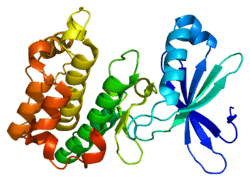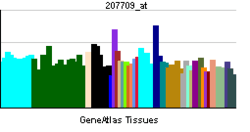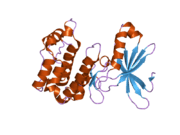PRKAA2
| View/Edit Human | View/Edit Mouse |
5'-AMP-activated protein kinase catalytic subunit alpha-2 is an enzyme that in humans is encoded by the PRKAA2 gene.[3][4]
Function
The protein encoded by this gene is a catalytic subunit of the AMP-activated protein kinase (AMPK). AMPK is a heterotrimer consisting of an alpha catalytic subunit, and non-catalytic beta and gamma subunits. AMPK is an important energy-sensing enzyme that monitors cellular energy status. In response to cellular metabolic stresses, AMPK is activated, and thus phosphorylates and inactivates acetyl-CoA carboxylase (ACC) and beta-hydroxy beta-methylglutaryl-CoA reductase (HMGCR), key enzymes involved in regulating de novo biosynthesis of fatty acid and cholesterol. Studies of the mouse counterpart suggest that this catalytic subunit may control whole-body insulin sensitivity and is necessary for maintaining myocardial energy homeostasis during ischemia.[4]
References
- ↑ "Human PubMed Reference:".
- ↑ "Mouse PubMed Reference:".
- ↑ Aguan K, Scott J, See CG, Sarkar NH (Dec 1994). "Characterization and chromosomal localization of the human homologue of a rat AMP-activated protein kinase-encoding gene: a major regulator of lipid metabolism in mammals". Gene. 149 (2): 345–50. doi:10.1016/0378-1119(94)90174-0. PMID 7959015.
- 1 2 "Entrez Gene: PRKAA2 protein kinase, AMP-activated, alpha 2 catalytic subunit".
Further reading
- Hardie DG, MacKintosh RW (1995). "AMP-activated protein kinase--an archetypal protein kinase cascade?". BioEssays. 14 (10): 699–704. doi:10.1002/bies.950141011. PMID 1365882.
- Hardie DG (1992). "Regulation of fatty acid and cholesterol metabolism by the AMP-activated protein kinase". Biochim. Biophys. Acta. 1123 (3): 231–8. doi:10.1016/0005-2760(92)90001-c. PMID 1536860.
- Carling D (2004). "The AMP-activated protein kinase cascade--a unifying system for energy control". Trends Biochem. Sci. 29 (1): 18–24. doi:10.1016/j.tibs.2003.11.005. PMID 14729328.
- Beri RK, Marley AE, See CG, Sopwith WF, Aguan K, Carling D, Scott J, Carey F (1995). "Molecular cloning, expression and chromosomal localisation of human AMP-activated protein kinase". FEBS Lett. 356 (1): 117–21. doi:10.1016/0014-5793(94)01247-4. PMID 7988703.
- Bonaldo MF, Lennon G, Soares MB (1997). "Normalization and subtraction: two approaches to facilitate gene discovery". Genome Res. 6 (9): 791–806. doi:10.1101/gr.6.9.791. PMID 8889548.
- Vavvas D, Apazidis A, Saha AK, Gamble J, Patel A, Kemp BE, Witters LA, Ruderman NB (1997). "Contraction-induced changes in acetyl-CoA carboxylase and 5'-AMP-activated kinase in skeletal muscle". J. Biol. Chem. 272 (20): 13255–61. doi:10.1074/jbc.272.20.13255. PMID 9148944.
- Stapleton D, Woollatt E, Mitchelhill KI, Nicholl JK, Fernandez CS, Michell BJ, Witters LA, Power DA, Sutherland GR, Kemp BE (1997). "AMP-activated protein kinase isoenzyme family: subunit structure and chromosomal location". FEBS Lett. 409 (3): 452–6. doi:10.1016/S0014-5793(97)00569-3. PMID 9224708.
- Stein SC, Woods A, Jones NA, Davison MD, Carling D (2000). "The regulation of AMP-activated protein kinase by phosphorylation". Biochem. J. 345 (3): 437–43. doi:10.1042/0264-6021:3450437. PMC 1220775
 . PMID 10642499.
. PMID 10642499. - da Silva Xavier G, Leclerc I, Salt IP, Doiron B, Hardie DG, Kahn A, Rutter GA (2000). "Role of AMP-activated protein kinase in the regulation by glucose of islet beta cell gene expression". Proc. Natl. Acad. Sci. U.S.A. 97 (8): 4023–8. doi:10.1073/pnas.97.8.4023. PMC 18135
 . PMID 10760274.
. PMID 10760274. - Mu J, Brozinick JT, Valladares O, Bucan M, Birnbaum MJ (2001). "A role for AMP-activated protein kinase in contraction- and hypoxia-regulated glucose transport in skeletal muscle". Mol. Cell. 7 (5): 1085–94. doi:10.1016/S1097-2765(01)00251-9. PMID 11389854.
- Minokoshi Y, Kim YB, Peroni OD, Fryer LG, Müller C, Carling D, Kahn BB (2002). "Leptin stimulates fatty-acid oxidation by activating AMP-activated protein kinase". Nature. 415 (6869): 339–43. doi:10.1038/415339a. PMID 11797013.
- Dubbelhuis PF, Meijer AJ (2002). "Hepatic amino acid-dependent signaling is under the control of AMP-dependent protein kinase". FEBS Lett. 521 (1–3): 39–42. doi:10.1016/S0014-5793(02)02815-6. PMID 12067722.
- Esumi H, Izuishi K, Kato K, Hashimoto K, Kurashima Y, Kishimoto A, Ogura T, Ozawa T (2002). "Hypoxia and nitric oxide treatment confer tolerance to glucose starvation in a 5'-AMP-activated protein kinase-dependent manner". J. Biol. Chem. 277 (36): 32791–8. doi:10.1074/jbc.M112270200. PMID 12091379.
- Nielsen JN, Mustard KJ, Graham DA, Yu H, MacDonald CS, Pilegaard H, Goodyear LJ, Hardie DG, Richter EA, Wojtaszewski JF (2003). "5'-AMP-activated protein kinase activity and subunit expression in exercise-trained human skeletal muscle". J. Appl. Physiol. 94 (2): 631–41. doi:10.1152/japplphysiol.00642.2002. PMID 12391032.
- Wojtaszewski JF, Mourtzakis M, Hillig T, Saltin B, Pilegaard H (2002). "Dissociation of AMPK activity and ACCbeta phosphorylation in human muscle during prolonged exercise". Biochem. Biophys. Res. Commun. 298 (3): 309–16. doi:10.1016/S0006-291X(02)02465-8. PMID 12413941.
- Hallows KR, McCane JE, Kemp BE, Witters LA, Foskett JK (2003). "Regulation of channel gating by AMP-activated protein kinase modulates cystic fibrosis transmembrane conductance regulator activity in lung submucosal cells". J. Biol. Chem. 278 (2): 998–1004. doi:10.1074/jbc.M210621200. PMID 12427743.
- Zong H, Ren JM, Young LH, Pypaert M, Mu J, Birnbaum MJ, Shulman GI (2003). "AMP kinase is required for mitochondrial biogenesis in skeletal muscle in response to chronic energy deprivation". Proc. Natl. Acad. Sci. U.S.A. 99 (25): 15983–7. doi:10.1073/pnas.252625599. PMC 138551
 . PMID 12444247.
. PMID 12444247.


